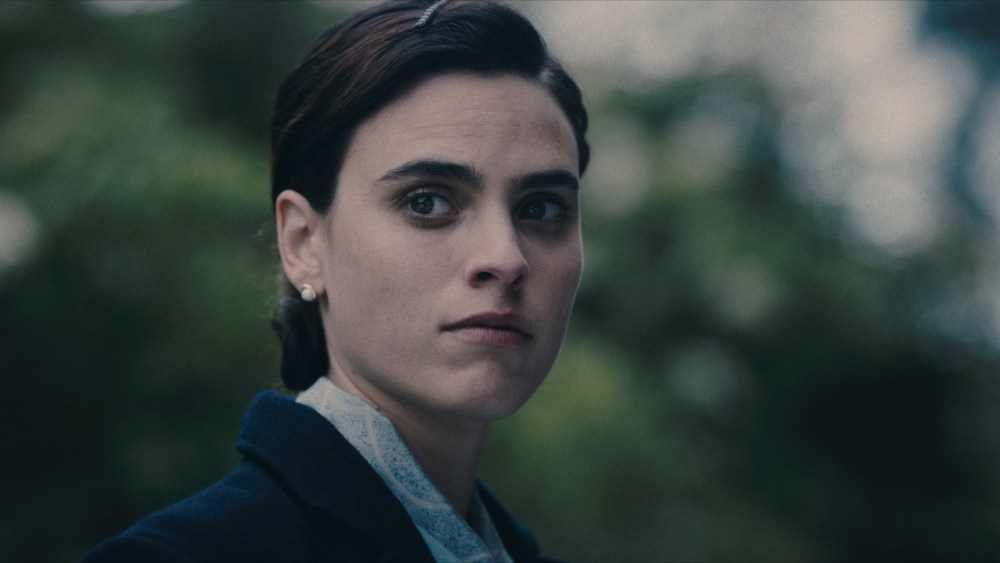Filmax has picked up international sales on “Karmele,” directed by Basque Asier Altuna and produced by Marian Fernández Pascal at San Sebastián-based Txintxua Films and Esnatzeko Ordua Films.
Inspired by Kirmen Uribe’s fact based novel “La hora de despertarnos juntos,” the Basque drama retraces the life of a real-life figure, Karmele Urresti, a nurse forced into exile during the Spanish Civil War. Played by Jone Laspiur, she falls in love with trumpet player Txomin Letamendi (Eneko Sagardoy) in France, and together they build a family across Paris, Caracas and Bilbao while navigating the fracture between love, loyalty and political conviction.
Altuna was struck by the density of events packed into the couple’s biography: expulsion, clandestine work against the dictatorship, collaboration with U.S. intelligence, two exiles in as many decades. “The temptation was to chase the sweep of history,” he admits, but the film deliberately narrows its gaze. “I had to restrain myself. What mattered most was their inner life — their dignity, but also their doubts, fears and contradictions.”
The relationship at the center of the film reflects that tension between personal and political. Txomin throws himself into militancy, committed to the collective cause. Karmele looks toward the family, to care, to the future of her children. Neither yields, and the fracture between their paths becomes part of the film’s central conflict. Altuna insists this is what makes them relatable: strength mixed with fragility, love complicated by conviction.
Language itself becomes a field of resistance. Karmele’s mother, Carmen, was a teacher barred from her profession for giving classes in Basque. “She was disqualified and banished for 15 years, simply for teaching children who often didn’t speak another language,” Altuna told Variety.
That experience shapes Karmele’s outlook, even in exile. She dedicates herself to ensuring her children recover the freedom to speak the forbidden tongue. “It’s not only a story of militancy or exile; it’s about transmission. Identity is preserved through language. In the everyday, in the small things, a battle for dignity is also fought.”
The film’s visual and sonic texture reflects that interplay between joy and loss. Early sequences hum with music, Basque folk, jazz, salsa conveying the excitement of discovery as exiles navigate new worlds. The Eresoinka choir’s rendition of Gernika embodies the defiance of a displaced community, while an improvised bertsolari verse reaches back toward something primal. Yet when the family returns to Bilbao, the soundtrack falls away. “Suddenly, there is silence. That was a conscious decision. Only then is the weight of oppression truly felt,” Altuna explained.
He and composer Aitor Etxeberria avoided dramatic scoring, leaning instead on diegetic music and the absence of sound. “We didn’t want to impose an emotion,” the director explains. “Silence itself becomes oppressive. The audience is left space to construct their own narrative.”
Visually, the film favors ellipsis and detail. Instead of re-creating battles, Altuna lingers on gestures: a farmer bartering milk for squid, a father hiding valuables in a chest, a woman’s arms folded. “Nature has its own drama. I like to dwell on nuances, on what connects us to memory,” he said. “Those images come from stories I heard as a child, from the fragments of war that reached us in peacetime. They are part of my truth.”

Karmele
Actors Jone Laspiur (“Ane Is Missing”) and Eneko Sagardoy (“Irati”) worked closely from accounts given by Karmele’s surviving children, who described her speech, gestures and way of facing life. Weeks of preparation preceded the short shoot, allowing performances to emerge naturally. “The actors knew exactly where they were in each scene,” Altuna recalled. “Rehearsals, costumes, sets — everything helped step into another era. The result feels balanced: performance, staging, narrative all supporting each other.”
Though grounded in Basque experience, “Karmele” aims wider. It asks what happens when the world collapses and people are forced to decide between surrender and dignity. “This is not just another Civil War film. If the same events were happening today, anywhere rights are violated and fear imposed, it would be the same story. It speaks to how we sustain humanity in the midst of chaos.”
The director is especially drawn to the way his protagonists chose art as a form of resistance. Basque exiles formed the Eresoinka choir to tour Europe, warning of fascism’s advance through music and dance. “Against violence and authoritarianism they opted for culture. They believed art could alert democracies to barbarism,” he says.
Altuna sees parallels today. “That border between freedom and oppression can blur very quickly. At a time when totalitarianism resurfaces in different parts of the world, cinema too can be a form of resistance — and of continuing to believe in the possibility of a fairer world.”

